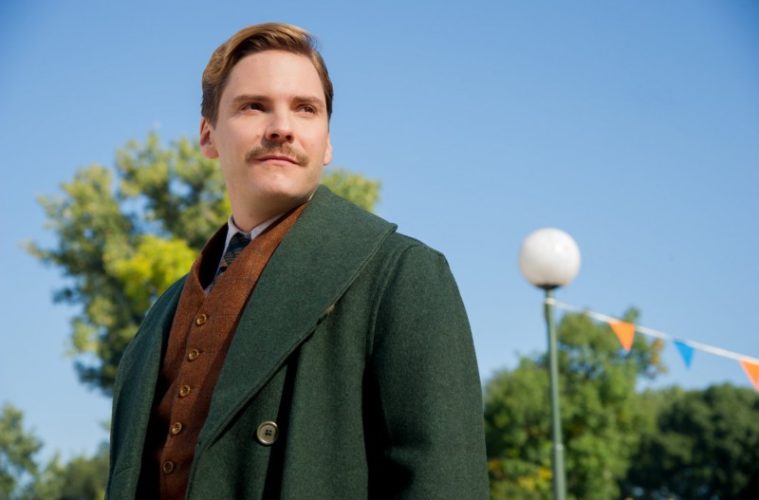
Among the many horror stories that sprung from WWII, one of the lesser-known, at least in terms of popular culture, is the pillaging of the Warsaw Zoo, which the Germans bombarded so that they could steal what they considered the most valuable animals. The operation was led by zoologist Lutz Heck, who intended to use the animals to bring back to life species that had long been extinct. In Niki Caro’s The Zookeeper’s Wife, Heck is played by Daniel Brühl, who begins as a noble scientist who seems interested in helping zookeepers Jan (Johan Heldenbergh) and his wife Antonina (Jessica Chastain) with their preservation mission, but slowly reveals his true colors, for his obsession with science only helps reveal his lack of empathy and humanity.
Brühl is no stranger to playing characters who defy audience sympathy, having played supervillain Helmut Zemo in Captain America: Civil War, Nazi hero Fredrick Zoller in Inglourious Basterds, and the arrogant race car driver Niki Lauda in Rush. Perhaps because he surrenders himself completely to the slimy nature of characters, Brühl is always extremely compelling to watch, even as one might want to look away. I spoke to him about entering the mind of Lutz Heck, why he’s keen on playing real-life people, and how shooting a Marvel movie was unlike nothing else he’d done before.
The Film Stage: What attracts you to playing a character like Lutz Heck?
Daniel Brühl: At first I was a bit reluctant because, as a German actor, you’re always a bit cautious when you’re asked to play a Nazi. But then I realized there were so many different aspects about this man that fascinated me: his obsessive character, his weird dream of creating the Germanic forest and to rebreed extinct animals, being absorbed by this megalomaniac, National Socialist vision — those were things that fascinated me. Of course his relationship with Antonina in the film was interesting because it changes him throughout the course of the story. You have a man who starts as being a friend of this couple, an educated, eloquent man, a scientist who at the end becomes a beast, losing all his human values. As a general idea I was fascinated by the idea of playing a man who loses his humanity in a film that deals with zoos and animals.
Heck was clearly very smart, but he used his knowledge to do evil, how do you access someone who made decisions you probably wouldn’t have made?
I read a lot about this chapter in history and there some aspects I didn’t know about, so I knew about the Żabińskis but I didn’t know about him. I started reading the books Heck wrote on zoology during his safari adventures in Africa. His own writing made it easy for me to get into his mind, so I could understand his determination, focus and passion for nature, animals, but especially for that idea of recreating something that was extinct. It was interesting to see the rebirth of that Germanic culture that the Nazis were very clever in abusing, and used as a tool to seduce the Germans by telling them about the greatness and power of their ancestors. It’s also quite surreal and insane when you read it, there are aspects you can’t take seriously.

The movie’s also coming out at a time when we’re seeing a rise in fascism and extremist nationalism. Has this made you think of it in a new light?
It makes the film relevant, unfortunately. It’s sad to see we haven’t overcome certain waves in history. Fascism is not extinct. I think it’s important to tell these stories to remind everyone of what happened. These moments in history shouldn’t come back, but it’s the case at the moment — we’re living in very unstable times, and I don’t want to be too pessimistic, but I hope we can remind ourselves of all the wonderful things we have achieved with democracy.
As of late you’ve had the opportunity to play many real-life characters in films such as The Woman in Gold and The Fifth Estate. Your father was a documentary filmmaker, and I wondered if watching him capture reality on his camera made you interested in doing the same with the characters you choose to play?
He definitely had a strong influence on me. I think it’s because of him that I decided to become an actor, and it was certainly because of his education that I’m interested in telling certain stories. So yes, you’re absolutely right. These are the films and stories that matter a lot to me. I’m always very open to any kind of genre — I’m happy to be in a comedy, to do all sorts of different films — but there’s always an interest in films with a sociopolitical, historical subject matter, which definitely comes from my father.
So does getting to be in a Captain America film feel like a break after doing all the social dramas?
Yeah, it was very refreshing! It meant traveling to a completely different universe. I fully enjoyed the whole experience. It was totally new to me, unknown. It made me feel like a 12-year-old: I was always in awe, running around the set with wide eyes being amazed by the scale of it all. But also by how professional everybody is on these films. I understood that it’s not easy to make these films for anybody involved; they’re highly demanding, visually and technically. From an actor’s point of view it’s very difficult to be a convincing superhero, so I was very impressed by the focus and determination and energy put into the characters by all these guys involved. Chris Evans, Robert Downey Jr. were all so impressive to see.

The Zookeeper’s Wife enters limited release on Friday, March 31st.

